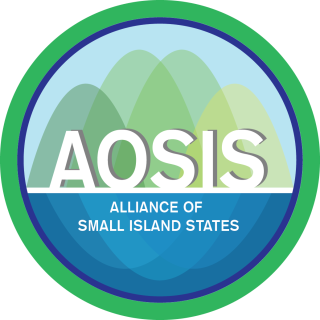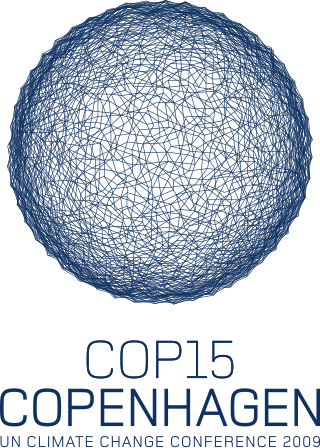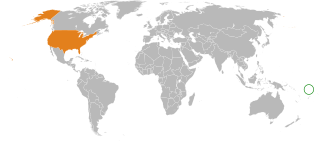
The Pacific Islands Forum (PIF) is an inter-governmental organization that aims to enhance cooperation among countries and territories of Oceania, including formation of a trade bloc and regional peacekeeping operations. It was founded in 1971 as the South Pacific Forum (SPF), and changed its name in 1999 to "Pacific Islands Forum", so as to be more inclusive of the Forum's Oceania-spanning membership of both north and south Pacific island countries, including Australia. It is a United Nations General Assembly observer.

Alliance of Small Island States (AOSIS) is an intergovernmental organization of low-lying coastal and small island countries. AOSIS was established in 1990, ahead of the Second World Climate Conference. The main purpose of the alliance is to consolidate the voices of Small Island Developing States (SIDS) to address global warming.
DARA is an independent, international organization based in Madrid, Spain. DARA was established in 2003 by Silvia Hidalgo to assess the impact of humanitarian aid and to make specific recommendations for changes in policies and practices. DARA has carried out evaluations in more than 60 crises countries for a variety of organizations including United Nations agencies, the International Federation of Red Cross and Red Crescent Societies, the European Commission, governments and non-governmental organizations (NGOs).

The 2009 United Nations Climate Change Conference, commonly known as the Copenhagen Summit, was held at the Bella Center in Copenhagen, Denmark, between 7 and 18 December. The conference included the 15th session of the Conference of the Parties to the United Nations Framework Convention on Climate Change (UNFCCC) and the 5th session of the Conference of the Parties serving as the Meeting of the Parties to the Kyoto Protocol. According to the Bali Road Map, a framework for climate change mitigation beyond 2012 was to be agreed there.

Tuvalu – United States relations are bilateral relations between Tuvalu and the United States.

The Major Economies Forum on Energy and Climate (MEF) was launched on March 28, 2009. The MEF is intended to facilitate a candid dialogue among major developed and developing economies, help generate the political leadership necessary to achieve a successful outcome at the December UN climate change conference in Copenhagen, and advance the exploration of concrete initiatives and joint ventures that increase the supply of clean energy while cutting greenhouse gas emissions. Denmark, in its capacity as the President of the December 2009 Conference of the Parties to the UN Framework Convention on Climate Change, and the United Nations have also participated in this dialogue along with Observers.

Climate change is particularly threatening for the long-term habitability of the island country of Tuvalu, which has a land area of only 26 square kilometres (10 sq mi) and an average elevation of less than 2 metres (6.6 ft) above sea level, with the highest point of Niulakita being about 4.6 metres (15 ft) above sea level. Potential threats to the country due to climate change include rising sea levels, increasingly severe tropical cyclones, high temperatures, and drought. King tides can combine with storm surges and the rising sea level to inundate the low lying atolls.

The 2010 United Nations Climate Change Conference was held in Cancún, Mexico, from 29 November to 10 December 2010. The conference is officially referred to as the 16th session of the Conference of the Parties (COP 16) to the United Nations Framework Convention on Climate Change (UNFCCC) and the 6th session of the Conference of the Parties serving as the meeting of the Parties (CMP 6) to the Kyoto Protocol. In addition, the two permanent subsidiary bodies of the UNFCCC — the Subsidiary Body for Scientific and Technological Advice (SBSTA) and the Subsidiary Body for Implementation (SBI) — held their 33rd sessions. The 2009 United Nations Climate Change Conference extended the mandates of the two temporary subsidiary bodies, the Ad Hoc Working Group on Further Commitments for Annex I Parties under the Kyoto Protocol (AWG-KP) and the Ad Hoc Working Group on Long-term Cooperative Action under the Convention (AWG-LCA), and they met as well.

Karen Christiana Figueres Olsen is a Costa Rican diplomat who has led national, international and multilateral policy negotiations. She was appointed Executive Secretary of the UN Framework Convention on Climate Change (UNFCCC) in July 2010, six months after the failed COP15 in Copenhagen. During the next six years she worked to rebuild the global climate change negotiating process, leading to the 2015 Paris Agreement, widely recognized as a historic achievement.

Enele Sosene Sopoaga PC is a Tuvaluan diplomat and politician who was Prime Minister of Tuvalu from 2013 to 2019.
The Tarawa Climate Change Conference (TCCC), was held in the Republic of Kiribati from 9 to 10 November 2010. The purpose of the conference was to support the initiative of the President of Kiribati, Anote Tong, to hold a consultative forum between vulnerable states and their partners with a view of creating an enabling environment for multi-party negotiations under the auspices of the UNFCCC. The conference was the successor event to the Climate Vulnerable Forum held in November 2009 in the Maldives, when eleven climate vulnerable countries signed the Bandos Island declaration pledging to show moral leadership and commence greening their economies by voluntarily committing to achieving carbon neutrality. Based on the lessons learned in the COP process, the TCCC proposed a more inclusive format of consultations, involving key partners among major developed and developing nations.
The Ambo Declaration was adopted at the Tarawa Climate Change Conference on 10 November 2010 by Australia, Brazil, China, Cuba, Fiji, Japan, Kiribati, Maldives, Marshall Islands, New Zealand, Solomon Islands and Tonga. The declaration calls for more and immediate action to be undertaken to address the causes and adverse impacts of climate change. The Ambo Declaration, named after the village in Kiribati where parliament sits, was slated to be a non-legally-binding agreement between the nations to present at the larger international climate change summit, COP16 in Cancun, Mexico.
The Climate Vulnerability Monitor (CVM) is an independent global assessment of the effect of climate change on the world's populations brought together by panels of key international authorities. The Monitor was launched in December 2010 in London and Cancun to coincide with the UN Cancun Summit on climate change (COP-16). Developed by DARA and the Climate Vulnerable Forum, the report is meant to serve as a new tool to assess global vulnerability to various effects of climate change within different nations.
The Majuro Declaration is an initiative of the Pacific Islands Forum, which was signed on 5 September 2013 at Majuro in the Marshall Islands during the 44th Pacific Islands Forum summit. At the summit the leaders of the Pacific Islands Forum nations recognised the need for strengthened national systems to plan for, access, deliver, absorb and monitor climate change and for donor countries to continue to simplify and harmonise their assessment, implementation and reporting processes for financing projects directed to climate change adaptation, mitigation and risk reduction.

The 2015 United Nations Climate Change Conference, COP 21 or CMP 11 was held in Paris, France, from 30 November to 12 December 2015. It was the 21st yearly session of the Conference of the Parties (COP) to the 1992 United Nations Framework Convention on Climate Change (UNFCCC) and the 11th session of the Meeting of the Parties (CMP) to the 1997 Kyoto Protocol.

The International Solar Alliance (ISA) is an alliance of more than 120 signatory countries, most being sunshine countries, which lie either completely or partly between the Tropic of Cancer and the Tropic of Capricorn. The primary objective of the alliance is to work for the efficient consumption of solar energy to reduce dependence on fossil fuels. This initiative was first proposed by Indian Prime Minister Narendra Modi in a speech in November 2015 at Wembley Stadium in which he referred to sunshine countries as Suryaputra. The alliance is a treaty-based inter-governmental organization. Countries that do not fall within the Tropics can join the alliance and enjoy all benefits as other members, with the exception of voting rights.

The 2016 United Nations Climate Change Conference was an international meeting of political leaders and activists to discuss environmental issues. It was held in Marrakech, Morocco, on 7–18 November 2016. The conference incorporated the twenty-second Conference of the Parties (COP22), the twelfth meeting of the parties to the Kyoto Protocol (CMP12), and the first meeting of the parties to the Paris Agreement (CMA1). The purpose of the conference was to discuss and implement plans about combatting climate change and to "[demonstrate] to the world that the implementation of the Paris Agreement is underway". Participants work together to come up with global solutions to climate change.

The effects of climate change on small island countries are affecting people in coastal areas through sea level rise, increasing heavy rain events, tropical cyclones and storm surges. These effects of climate change threaten the existence of many island countries, their peoples and cultures. They also alter ecosystems and natural environments in those countries. Small island developing states (SIDS) are a heterogenous group of countries but many of them are particularly at risk to climate change. Those countries have been quite vocal in calling attention to the challenges they face from climate change. For example, the Maldives and nations of the Caribbean and Pacific Islands are already experiencing considerable impacts of climate change. It is critical for them to implement climate change adaptation measures fast.

Climate change is a major issue for the Maldives. As an archipelago of low-lying islands and atolls in the Indian Ocean, the existence of the Maldives is severely threatened by sea level rise. By 2050, 80% of the country could become uninhabitable due to global warming. According to the World Bank, with "future sea levels projected to increase in the range of 10 to 100 centimeters by the year 2100, the entire country could be submerged". The Maldives is striving to adapt to climate change, and Maldivian authorities have been prominent in international political advocacy to implement climate change mitigation.
TheVulnerable Twenty Group (V20) is a cooperation initiative of countries systemically vulnerable to climate change. It encompasses 68 nations, representing approximately 20% of the world's population, and generating about 5% of global emissions, that are particularly affected by climate change. The initiative was founded in October 2015 in Lima, Peru, with the founding Chair the Philippines at the climate vulnerable forum by the 20 founding members: Afghanistan, Bangladesh, Barbados, Bhutan, Costa Rica, Ethiopia, Ghana, Kenya, Kiribati, Madagascar, Maldives, Nepal, Philippines, Rwanda, Saint Lucia, Tanzania, East Timor, Tuvalu, Vanuatu and Vietnam.
















